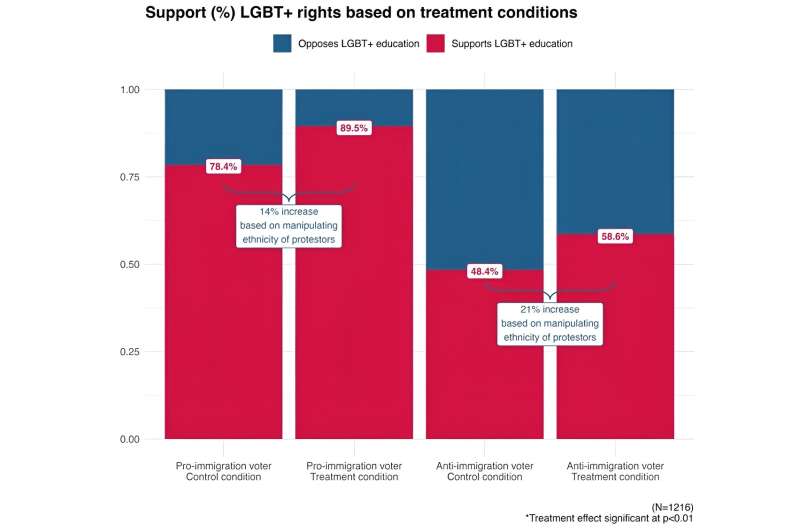
Table showing: Support (%) LGBT+ rights based on treatment conditions. Credit: Stuart Turnbull-Dugarte
Cross-national research carried out by the University of Southampton and Vrije Universiteit Amsterdam (VUA) into public opinion on LGBT+ rights has shown that anti-immigrant prejudices, particularly towards Muslims, contributes to explaining some of the widespread shifts in tolerance towards the LGBT+ community. Findings of a new study show this was especially evident among socially conservative voters.
The rise of tolerance towards LGBT+ individuals in Western democracies could be seen as remarkable, according to the researchers. Whereas a majority of citizens rejected the idea of same-sex marriage a couple of decades ago, a majority of citizens in Europe, the US and elsewhere—regardless of their political attachment to the left or right—support this policy and LGBT+ rights more generally.
However, in an original social experiment, Stuart Turnbull-Dugarte of the University of Southampton and Alberto López Ortega of VUA discovered that shifts in tolerance towards LGBT+ individuals are far more superficial than first assumed and are heavily conditioned by who the opponents of LGBT+ rights are.
The researchers’ findings are published in the American Political Science Review.
The authors’ experiment, which involved 2,400 individuals from the UK and Spain, showed individuals a news story about anti-LGBT+ protests. The researchers randomized whether the protestors presented in the news story were white individuals with typical “Western” names or whether they were non-white individuals in typical Muslim dress and had typical Islamic names. The participants were then asked their views on LGBT+ inclusive education in schools.
The results of the social experiment revealed that those shown the news stories with Muslim protestors were significantly more inclined to express positive support for LGBT+ rights compared to those shown the news stories with non-Muslim protestors.
These differences were greatest among those who held more conservative views on immigration, who typically also hold more conservative views on LGBT+ rights. These experimental changes in support were shown to be of great significance, equal to a difference in support for LGBT+ of 21% in some cases. The findings also showed, to a lesser extent, an increase from those with more liberal views.
Turnbull-Dugarte said, “”The enemy of my enemy is my friend’ is a proverb that’s familiar to many. What we show here is that this proverb also helps us understand how views towards LGBT+ rights have liberalized so quickly among traditionally conservative-minded voters with prejudicial views, who are more likely to reject LGBT+ rights advances and the cultural changes that come about from migration.
“In a context where ethnic minorities, in this case Muslims, are perceived to oppose one of the other groups that social conservatives dislike—like the LGBT+ community—we show that these same nativist voters are happy to back LGBT+ rights advances to distance themselves from other minorities to legitimize their anti-immigration stance. This may indicate that the liberal credentials of the UK, and other western nations, is likely far more superficial than first thought.”
This study speaks to the wider efficacy of political strategies used by far-right actors, in the UK and elsewhere, to legitimize their anti-immigration policy positions and drive selective liberalism in other progressive policy areas such as those related to women’s rights and environmental protections.
More information:
Instrumentally Inclusive: The Political Psychology of Homonationalism, American Political Science Review (2023). DOI: 10.1017/S0003055423000849
Citation:
Study uncovers link between anti-immigrant prejudices and support for LGBT+ rights (2023, September 13)
retrieved 13 September 2023
from https://phys.org/news/2023-09-uncovers-link-anti-immigrant-prejudices-lgbt.html
This document is subject to copyright. Apart from any fair dealing for the purpose of private study or research, no
part may be reproduced without the written permission. The content is provided for information purposes only.
>>> Read full article>>>
Copyright for syndicated content belongs to the linked Source : Phys.org – https://phys.org/news/2023-09-uncovers-link-anti-immigrant-prejudices-lgbt.html
